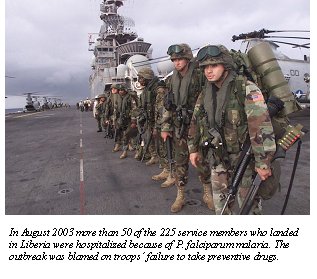
 Product Name: Mefloquine
Product Name: MefloquineCommercial Name: Larium Application: Antimalarial drug for treatment and prevention Date of Licensure: May 1989 Type of Product: : synthetic 4-quinoline methanol (quinine analog) Company of manufacture: : Hoffman-LaRoche Reasons for development:The prototype drug for mefloquine was SN 10275, discovered by Americans during the World War II years. Mefloquine (WR 149240) was developed by the Division of Experimental Therapeutics at Walter Army Institute of Research (WRAIR) in the late 1960's under the auspices of the U.S. Army Medical Research and Development Program in collaboration with the World Health Organization Special Programme for Training and Research in Tropical Diseases (WHO/TDR) and Hoffman-LaRoche, Inc. The Division of Experimental Therapeutics has the expertise and laboratory capability to carry a potential antimalarial compound from the chemist's bench through efficacy testing, toxicity testing and clinical trials to licensure by the U.S. Food and Drug Administration (FDA). In recent years, the institute has increasingly formed partnerships with the pharmaceutical industry and WHO when possible to help finance and expedite the increasingly expensive and complicated drug development process. Surveillance of service members using mefloquine has provided additional information. During U.S. military operations in Somalia, mefloquine was not approved for use in pregnant women. Some female service members who were unaware they were pregnant inadvertently ingested mefloquine. Follow-up revealed no congenital defects among the infants. Currently the drug is recommended as an antimalarial prophylaxis in pregnant women at risk of chloroquine-resistant antimalarial infection. Mefloquine is a relatively low-cost antimalarial with a long half-life which permits weekly dosing, and is still the mainstay antimalarial for the U.S. military. However, adverse neuropsychiatric effects have been reported, which has had a negative impact on compliance. Also, malaria parasites have developed resistance to the drug, especially in southeast Asia and East Africa, although the mechanism of antimalarial action of mefloquine is unknown (as is the case with quinine). Role of DoD:: The U.S. Army established an intensive malaria research and development program during the Vietnam War to develop new prophylactic and therapeutic drugs for military use. This research was coordinated through the Division of Experimental Therapeutics at the Walter Reed Army Institute of Research (WRAIR) now located in Silver Spring, Maryland. Current Status:The need for new antimalarial drugs is illustrated by the events that occurred during the 2003 peacekeeping operations in Liberia. Of 290 troops who stepped ashore there, 80 developed malaria (28%) and 69(44%) of the 147 who spent at least one night ashore acquired the disease. Five malaria-infected marines required intensive care unit support. |
| Chloroquine | Primaquine | Sulfadoxine | Mefloquine | Doxycycline | Halofantrine | Atovaquone |
